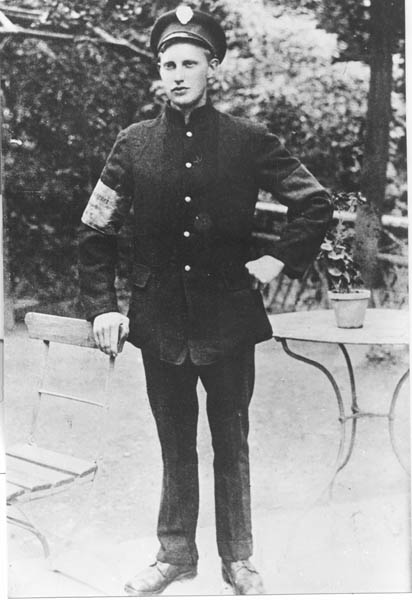Cumberland Council has now replaced the previous Cumbria County Council and 3 District Councils. The content on this website is still relevant including documents that may include the old county council logo. Find out about the council changes
Please update any cumbria.gov.uk browser shortcuts you may have to the new site pages as needed
Prisoners of War

Food Parcels for Border Regiment POWs
by Denis Perriam
A Carlisle Prisoner of War [POW] in Germany in 1916 wrote home to his sister asking her to send a pair of clogs. It was assumed he must have been working because this was the second pair he had asked for. In his note the prisoner said he had a letter from his comrades in the trenches and he "would swap places with them," but, he wrote, the "war cannot last much longer."
Another letter from Doeberitz POW Camp, published in the Carlisle Journal in August 1916, from a Cumbrian, said: "We have just put one of our chaps under the water tap for trying to convince us that the war will last two more years."
One Workington POW, who had been wounded and was in a German Military Hospital, wrote home in July 1915 to say "We receive exactly the same treatment as they do; same food and everything."
This was also the experience of Private W Ellwood of the Border Regiment [BR] who had been reported missing in France on 18 November 1916.He had managed to get a card sent home on 6 December 1916 to say he was in a German hospital and was "champion." In a second card, sent on 28 December 1916, he wrote: "We are well treated in hospital and get four meals a day," and that he was "getting on all right."
Private Dempsey of the BR, also a prisoner in Germany, wrote to his mother in early 1917: "For God's Sake send bread and a little tobacco." His mother was widowed and the West Cumberland Times stated: "To try and keep things going she works in the mill." She had managed to put together a small parcel for her son "out of her allowance, but could not understand why she could not send it." The newspaper explained: The regulations are that prisoners' parcels will be sent by one, and only one, authorised organisation, and that in this instance the Carlisle Citizens' League is the authorised organisation for the BR."
The WC Times pointed out that the prisoners "get little to eat and what little is supplied is lacking in quality." It was thought, the newspaper stated, "We ought to reduce their suffering as far as possible by supplying them with food and other comforts which they need."
Reporting on the progress of the scheme the newspaper stated in May that two Border men, Private Grant and Lance-Corporal Davidson of Cleator Moor "are already being amply provided with both food and clothing from Carlisle as well as bread from Berne," and both men acknowledged their parcels regularly. At a county conference in the Courts at Carlisle in December 1917, the question of raising further funds to maintain local POWs in Germany was discussed. The League were praised for what they had done and the sums involved were made known. It was hoped "to supplement by other means any grants that might be made out of the rates." The WC Times in February 1918 reported a Cumberland County Council grant of £6,000 for the relief of POWs. It was reported that in 1917, 872 Border POWs had received parcels on which £23,000 had been expended.
Giving an account of his experiences as a POW, doing forced labour in Germany, a Dalston soldier said in December 1918 "no prisoners get better parcels than the Border men."
The truth behind the treatment of POWs began to come out when prisoner exchanges were reported in the Journal in 1918. A Carlisle soldier from the 2nd BR, Messenger Nicholson, was "restored to his wife and family physically wrecked as the result of his treatment in a German prison camp." Early in the war at Ypres in October 1914 "the regiment was engaged for nine successive days in an unequal fight, with no opportunity of entrenching themselves and eventually they were overrun," stated the report, "and many of them surrounded, so Nicholson, with others, had no alternative but to surrender." They had all their personal possessions taken, "even the greatcoats and khaki jackets from some prisoners." After a night in a schoolroom they were marched off to Lille: "They received a drink of water but no food and many of them were put on the point of collapse through hunger and exhaustion." As they went along the road "they were the victims of the German soldiers' spite, many of the Huns giving them kicks as they passed."
Nicholson said that at Lille Station they had a small chunk of black bread with a drink of water. There "they were herded together in cattle trucks which had recently been used and were still in filthy condition," reported the Journal, in which there was standing room only, "one truck containing 49 and others as many as 60 and among them were men who were suffering from recent wounds." In these trucks they travelled to Gottingen, five nights on the train "and during the whole of that period their only nourishment was the bread at Lille and a similar ration about midway on the journey." For weeks at Gottingen, under canvas, they had only one slice of bread a day.
"They used to bash me with rifles or sticks and they kept this up till the hinder end of 1915," stated Nicholson, but "in the end they gave up trying to get me to work." His account of their depravations filled a full column in the Journal, but in the newspaper Nicholson said: "The League has been very good to the Border men and I think you cannot say too much about the splendid parcels which the League sent us."
He ended his report by saying: "If it had not been for the League and the good friends at home, we would not have returned at all."

